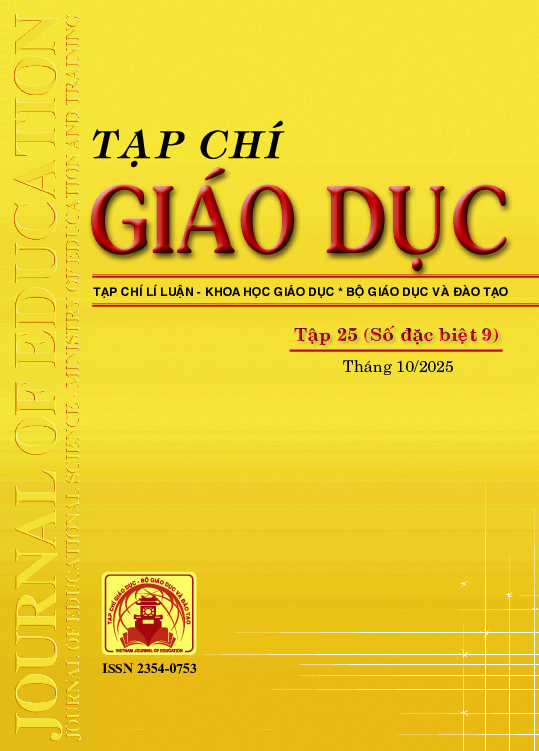Tư duy hệ thống trong tiếp nhận văn học – một giải pháp cá nhân hóa trong dạy học đọc hiểu văn bản văn học
Tóm tắt
Integrating systemic thinking into teaching reading comprehension of literary texts contributes to improving the quality of reception, creating conditions for developing comprehensive capacity and affirming the personal mark of students. This study proposes the application of systemic thinking as a personalized solution in teaching reading comprehension of literary texts at the secondary level. The pedagogical experiment was conducted for two weeks at two high schools with 170 grade 12 students, divided into experimental groups (taught using systemic thinking) and control groups (taught using traditional methods). The results showed that the experimental group had significantly higher average scores, and the learning products demonstrated logical thinking capacity, knowledge modeling and creativity. This affirms the effectiveness and feasibility of integrating systemic thinking into teaching Literature, contributing to improving the quality of reception and developing comprehensive competency of students.
Tài liệu tham khảo
Arnold, R. D., & Wade, J. P. (2015). A definition of systems thinking: A systems approach. Procedia Computer Science, 44, 669-678. https://doi.org/10.1016/j.procs.2015.03.050
Bộ GD-ĐT (2018). Chương trình giáo dục phổ thông - Chương trình tổng thể (ban hành kèm theo Thông tư số 32/2018 TT-BGDĐT ngày 26/12/2018 của Bộ trưởng Bộ GD-ĐT).
Becker, D., & Matz, F. (2023). Reader-response theory and literature teaching in the 21st century. Winter, 41(1), 25-42.
Bloom, B. S. (Ed.). (1956). Taxonomy of educational objectives: The classification of educational goals. Handbook I: Cognitive domain. New York, NY: David McKay.
Campbell, D. T., & Stanley, J. C. (1963). Experimental and quasi-experimental designs for research. Boston, MA: Houghton Mifflin.
CAST. (2024). Universal design for learning guidelines version 3.0. http://udlguidelines.cast.org
Cohen, J. (1988). Statistical power analysis for the behavioral sciences (2nd ed.). Hillsdale, NJ: Lawrence Erlbaum Associates.
Essa, S. G., Celik, T., & Human-Hendricks, N. E. (2023). Personalised adaptive learning technologies based on machine learning techniques to identify learning styles: A systematic literature review. IEEE Access, 11, 48392-48409. https://doi.org/10.1109/ACCESS.2023.3276439
Field, A. (2013). Discovering statistics using IBM SPSS statistics (4th ed.). Sage.
Gašević, D., Dawson, S., Siemens, G., & Joksimovic, S. (2022). Learning analytics should not promote one-size-fits-all: The effects of scale-adjusted learning visualization. British Journal of Educational Technology, 53(1), 125-145. https://doi.org/10.1111/bjet.13165
Gevorgyan, S. (2024). The use of adaptive learning technologies in e-learning for inclusive education: A systematic review. E-Learning Innovation Journal, 2(1), 90-107. https://doi.org/10.57125/ELIJ.2024.03.25.05
Holmes, W., Bialik, M., & Fadel, C. (Eds.). (2019). Artificial intelligence in education: Promises and implications for teaching and learning. Pearson.
Iser, W. (1978). The act of reading: A theory of aesthetic response. Johns Hopkins University Press.
Kunjanman, S., & Aziz, N. A. (2021). Reader-response approach in literature classroom: A review of literature. International Journal of Education, 13(2), 35-49. https://doi.org/10.17509/ije.v13i2.12345
Nguyễn, V. A., & Nguyễn, C. H. (2025). The application of artificial intelligence for personalized student learning activities. HCMUE Journal of Science, 22(3), 534-545. https://doi.org/10.54607/hcmue.js.22.3.534
.
OECD (2018). The future of education and skills: Education 2030. OECD Publishing. https://doi.org/10.1787/9789264300002-en
OECD (2021). Artificial intelligence in education: Challenges and opportunities for sustainable development. OECD Publishing. https://doi.org/10.1787/1d0bc92a-en
Prasad, S. P., Jha, A., & Zehra, S. (2024). Blind to the machine: Reader-response theory in an age of artificially intelligent authors. Fortell, 49, 165-177.
Richmond, B. (1993). Systems thinking: Critical thinking skills for the 1990s and beyond. System Dynamics Review, 9(2), 113-133. https://doi.org/10.1002/sdr.4260090203
Lã Nhâm Thìn, Đỗ Ngọc Thống (đồng chủ biên), Trần Văn Toàn (chủ biên), Bùi Minh Đức, Bùi Thanh Hoa, Phạm Thị Thu Hương, Nguyễn Thị Tuyết Minh (2024). Ngữ văn 12 (tập một), bộ sách Cánh Diều. NXB Giáo dục Việt Nam.
Trần Thị Thu Hương (2022). Học tập cá nhân hóa: Các nhân tố cần thiết và lưu ý triển khai. Tạp chí Khoa học Giáo dục Việt Nam, 18(2), 1-6.
Đã Xuất bản
Cách trích dẫn
Số
Chuyên mục
Giấy phép

Tác phẩm này được cấp phép theo Ghi nhận tác giả của Creative Commons Giấy phép quốc tế 4.0 .












